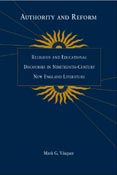Authority and Reform
Religious and Educational Discourses in Nineteenth-Century New England Literature

- Author(s): Vasquez, Mark G.
- Series:
- Imprint: Univ Tennessee Press
- Publication Date: 2003-02-28
- Status: Active
- Available in Hardcover - Cloth: Price $38.00 | Buy Now
- Leaf eReader required for PDF ebooks
In nineteenth-century New England, two dominant schools of theology—Unitarian-Transcendental and Calvinist-Evangelical—concerned themselves with the sweeping reforms then taking place in religion and education, but with different emphases on the place of the individual. Calvinists and Unitarians alike attempted to solve the paradox of individual and collective authority within the church and in society, but during this era a shift in discursive authority from the sermon to the mass-produced tract not only signaled an attempt to redefine the individual’s relationship to God and society, but also paralleled similar shifts in nineteenth-century educational culture, as pedagogical innovation attempted to redefine the student-teacher relationship.
This book explores the ways in which the interplay of religion and education fostered the concepts of self-culture and social refor, and shows how such interplay helped construct varying epistemologies, individualities, and discourse communities. Mark Vásquez traces the evolution of self-culture from a theological concept to an educational and literary one. Drawing on examples ranging from late-eighteenth-century epistolary novels and religious pamphlets to temperance texts, essays, and late-nineteenth-century sentimental novels, he shows how writers applied prevailing languages of power to promote the sweeping changes that churches and schools seemed incapable of carrying out by themselves. As a reformative force, the literary text encouraged activism among all its readers, but affected (and was affected by) women more profoundly than, and differently from, men.
Vásquez examines the Unitarian-Transcendental tradition as represented in the works of William Ellery Channing, Ralph Waldo Emerson, Amos Bronson Alcott, and Margaret Fuller, and the Calvinist-Evangelical line of the Beechers. Despite philosophical and stylistic differences between the two schools, Vásquez shows that there was mutual influence in the evolving New England discourse of self-culture. By reconsidering changes in religious, educational, and literary cultures in terms of the construction of individual and community identity, he demonstrates that authority and reform arose as the most pervasive social concerns of that era. A final chapter considers Harriet Beecher Stowe and Louisa May Alcott as inheritors of these respective legacies, urging their female readers to temper self-culture with self-sacrifice and to move beyond the domestic sphere toward an epicene community.
By making unsuspected connections between seemingly different authors and thinkers, VEasquez’s work links theological discourse, literary texts, and education theory in new and illuminating ways. Authority and Reform makes an important contribution to our understanding of the discourse of self-culture as it sheds new light on New England as representative of nineteenth-century American literature and culture.
The Author: Mark G. Vásquez is senior lecturer in English at Western New England College in Springfield, Massachusetts, and also teaches American studies at Anna Maria College in Paxton, Massachusetts.
